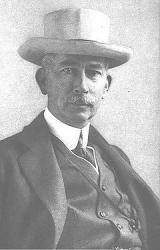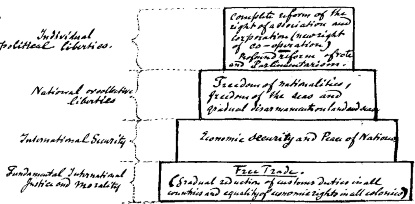4. Reform of international trade
Morality and international exchange
 "The final cause of natural phenomena, in the form of some matter passing into the spiritual state, began on our planet, as occurred the first exchange of goods or services. This gave birth, in both traders, to a striving for equivalence, equity and justice. A natural but superior strength, evolved from energy, this striving created on Earth, the first "moral force". The first exchange was the first "moral phenomenon"."
"The final cause of natural phenomena, in the form of some matter passing into the spiritual state, began on our planet, as occurred the first exchange of goods or services. This gave birth, in both traders, to a striving for equivalence, equity and justice. A natural but superior strength, evolved from energy, this striving created on Earth, the first "moral force". The first exchange was the first "moral phenomenon"."
– Henri Lambert
Moral principles of international trade
At the beginning of the war Henri Lambert took refuge in Holland and then went to England where he met the English pacifist movements. With Arnold Lupton (1846-1930), former professor at the University of Leeds, he wrote a draft peace treaty. For Henri Lambert, to be a free trader automatically generates pacifism. He was to become an uncompromising militant. For this dual cause he spared no effort to disseminate his ideas concerning both among the belligerents. So it was that during the autumn of 1915, a particularly fruitful period for his reflections, he completed the writing of a 30 page article on “Morality and International Trade”, in which he especially argued that:
• for peoples and individuals alike, economic rights are the primordial natural rights,
• economic freedom is the fundamental freedom,
• economic justice and morality are the primordial justice and morality,
• economic cooperation between peoples is the fundamental principle of international morality.
According to him, "The economic interests of men are their primordial interests. Their economic relations are their fundamental relations. This is true in the lives of individuals and groups within national communities. It is also true in the life of nations in international society. The economy is necessarily the basis for all policies. National economic policy is the basic national policy.”
"...we need (therefore) to make the difficult transition from military civilisation to economic and peaceful civilisation.
The first is characterised by:
- expansion of states by conquest, federation by force of arms, centralisation by the power of authority;
- enrichment, progress and unity of nations through the pacific system of free trade as applied to intra-national economic relations and,
- the warlike system of "balance of trade" and protectionism applied to international economic relations;
- order among nations maintained more or less by hegemony or the "balance of power".
Economic civilisation is characterised by:
- enrichment and general progress of peoples under the peaceful and pacifist system of free trade applied to international as well as to domestic relations;
- the gradual voluntary splitting up of large states, political decentralisation and the self-government of their constituent nationalities, according to ethnic, ethical, political or simply regional affinities and aspirations;
- increasing interpenetration and meeting of peoples, the mixing of temperaments and characters (favoured by the reduction in size of political units and the economic association of these smaller units);
- international solidarity assured by the unity of interests and moral aspirations: the cooperative association of peoples in material, intellectual and moral domains.”
The pyramid of freedoms
 On September 18, 1916, he left for the United States where in pacifist circles he met David Starr Jordan, the former leader of the American Peace Society (1910-1914) who introduced him, in November 1916, to the eminence grise of President Wilson, Colonel House. Between the two a current passed. There followed numerous meetings and exchanges of letters, such that one can write that the proclamation of President Wilson's 14 points on January 8, 1918 was influenced by the empathy if not actual friendship between these two men. In a letter dated March 12, 1917 to Colonel House, Henri Lambert explained his conception of freedom and peace.
On September 18, 1916, he left for the United States where in pacifist circles he met David Starr Jordan, the former leader of the American Peace Society (1910-1914) who introduced him, in November 1916, to the eminence grise of President Wilson, Colonel House. Between the two a current passed. There followed numerous meetings and exchanges of letters, such that one can write that the proclamation of President Wilson's 14 points on January 8, 1918 was influenced by the empathy if not actual friendship between these two men. In a letter dated March 12, 1917 to Colonel House, Henri Lambert explained his conception of freedom and peace.
I would like to be allowed, dear Colonel House, to draw your special attention to what appears to me to be a very important aspect of the European problem – namely, that freedom of nationalities and freedom of the seas cannot serve as causes of peace, they can only be its consequences. When it comes to practical policy, various important considerations make it impossible, when dealing with the peace problem, to neglect or be silent on these two very important questions. Nevertheless, they are not fundamental questions, they will not serve as the ‘foundations’ of the edifice of a reconstructed peaceful civilisation. This edifice must, I think, be understood in this way.” Liberty (national and individual) can only be preserved if grounded on security. This is what Sir Edward Grey meant in 1915, when he said that Great Britain was ready to discuss the question of ‘freedom of the seas’ but that the condition making this freedom possible had first to be established. Fundamental security is economic security…”
| Hierarchy of freedoms according to Henri Lambert | |
|
Individual |
Complete reform of the |
| National and collective liberties | Freedom of nationalities, freedom of the seas and gradual disarmements on land and seas |
| International Security | Economic security and peace of Nations |
| Fundamental International Justice and morality |
Free Trade (Gradual reduction of customs duties in all countries and equality of economic rights in all colonies) |
In the manner of Maslow, who 30 years later presented his hierarchy of needs, he presents here, his hierarchy of freedoms. Individual political freedom is not possible if there is no freedom of nations, requiring in turn a secure international context, itself dependent on free trade. Note also that in 1915, in his article written with Lupton on Morality and International Exchange, he had already grasped the hierarchy of needs well before Maslow formalised it. For Henri Lambert, the hierarchy of needs was a hierarchy of freedoms.
"Any policy must be based on morality, and morality itself cannot but have an economic basis. Romantic ideas and customs create romantic politics. Positive politics can only proceed from the principles of positive morality. These derive from the nature of things, that is to say, from the rational interpretation of natural moral phenomena.
Positive morality is natural morality. Moreover, it is natural primordial morality that manifests in the economic relations of men, from which they satisfy their physiological and vital needs, the spirit of man cannot be free, our intellect and our higher aspirations cannot flourish unless those needs have first been satisfied. "Economic morality” appears as fundamental for all activities and relations: individual, social, national, international.”
In an article, The Economic Cause and Solution of the European Crisis published in January 1915, he further clarified his thoughts. For him the root causes of the crisis lay beyond national psychological factors, which certainly played an undeniable role, but did not provide an adequate explanation. The general and permanent peace that everyone aspires to can only be determined using justice, not weapons. True justice in international relations is fundamentally formed by a policy favourable to the economic development of all nations without exception. "Thus the increase in material well-being of peoples is both the condition and the means of their intellectual and moral advancement – can civilisation really be the product of misery? Their right to develop economically, to an extent corresponding to the full richness of their soil and their capabilities, is an inviolable law of nature: a divine right. Moreover, the economic development of a nation is inseparable from the practice of increasing the extent of its trade with other nations. Trade thus appears as the essential fact and law of international relations. Any impediment to trade is a violation of international law. Free trade is the tangible manifestation and certain criterion of a true state of justice in the relations between peoples. Otherwise, international law – and the pacifism, which identifies itself with it – will continue to lack a solid and realistic foundation. Peace will be assured by law when the nations shall know truth and practice international law, characterised by free trade and thus likely to be recognised by all because respectful of everyone’s basic interests. Until international law and international justice become one, humanity will continue to know only periods of more or less precarious peace, which necessarily depend on the will and interests of those nations that possess arms."
Date de dernière mise à jour : 02/07/2021
